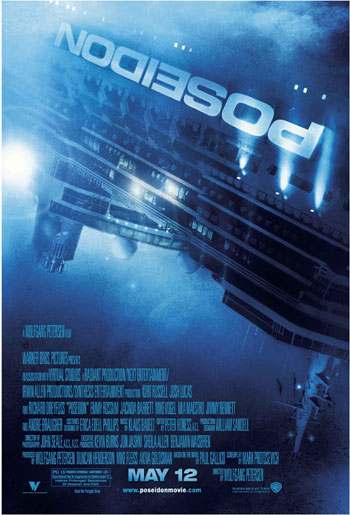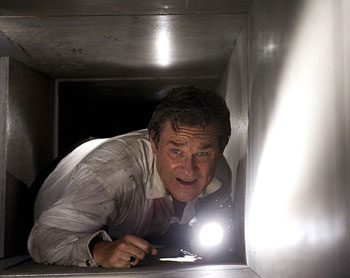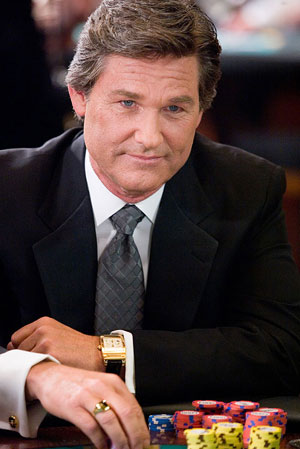 Snake Plissken. RJ MacReady. Jack Burton. Wyatt Earp. Kurt Russell’s been all of these guys, and any fanboy worth his salt knows and loves at least a couple of the great films Russell’s been involved with over the years. I was flown to LA to have round two with Richard Dreyfuss, but the real excitement for me was meeting Kurt Russell.
Snake Plissken. RJ MacReady. Jack Burton. Wyatt Earp. Kurt Russell’s been all of these guys, and any fanboy worth his salt knows and loves at least a couple of the great films Russell’s been involved with over the years. I was flown to LA to have round two with Richard Dreyfuss, but the real excitement for me was meeting Kurt Russell.
And let it be known that Kurt Russell has joined the lengthening list of celebrities who liked my shirt. (This time it was a Brandon Bird shirt, which has a beautiful drawing of the Law & Order characters joined by Batman)
Kurt’s about as nice, funny and self-aware as any celebrity I’ve ever interviewed. Because of the always confused and hectic scheduling at these things we only got about 14 minutes with him, but he made the most of it, being very upfront about his career and his newest film, Poseidon. Upfront and spoilery – if you haven’t seen the film yet (and looking at the box office, that’s a safe bet) and don’t want to be spoiled, avoid this interview entirely.
Q: We heard you tried to take out Josh [Lucas] with your flashlight?
Russell: Yeah, I did. It was one of those things when we were under water and I didn’t even know I’d hit him. We came up and Josh was bleeding really profusely. I mean he was really bleeding. I was like ‘What happened to you?’ ‘I think you hit me with the flashlight.’ I was like, ‘Probably. I don’t know.’
Q: What were your war stories?
Russell: Mine were from the sets themselves. I got an old kind of H-influenza, and I got a throat infection that the doctor didn’t find the first time he looked for it so it just got worse and worse and worse, and then I really got sick. And, you know, because we just sort of kept going I got pneumonia, but I was fortunate in that I had ten days off so I could get healthy to come back. I was also fortunate in that all the underwater stuff that I had to do I was in good shape for. I was healthy for that. But for the first two and a half months of the movie it was just one thing after another. I’d just get sick.
As far as being banged up physically it wasn’t that difficult of a show for me. I didn’t have that much stuff to do other than the normal kind of stuff, but it was the underwater stuff that was psychologically difficult to do because once you went in there was no way out. You also didn’t have goggles on so it was very difficult to see because of the lighting. And you were dependant on someone to swim in and give you air, underwater, and then they were going to have to lead you out. Psychologically, that’s difficult to put your trust in someone because by the time you reach the end, you’re out of air. And especially for me in the drowning scene – I read about this from, actually, The Perfect Storm. There’s a chapter in The Perfect Storm on drowning, and the types of drowning. I talked to Wolfgang and said, “I’d like to do this sort of, what I consider a The Bridge Over the River Kwai type of thing, you don’t know if he dies and then hits this button or if he in his final dying throes he does it. I’d like to sort of put in right in the middle there, but it’s going to take time. And Wolfgang said, ‘Yeah, I’d like to do that. That’d be great.’
The difficulty there is that the time that that takes to do – to swim into the room, look for the stuff – you have to pass out sort of first. You have to pass out before you drown, in that type of scenario, in that kind of a drowning. And when you pass out then you suck air and then you begin to drown, which takes you into a different kind of gear. chemically. And then finally you’re kind of euphoric, but dead. I was reading about this and I said, I want to do this right. And Wolfgang liked the idea of doing it this way. Anyway the point is that I had to say to the guy that was coming in to give me air, I said, ‘Look. I’m going to have to get to this point where I’m just floating, after I’ve done this, and we need enough time to know that I’m in fact for sure dead.’ But I said ‘I don’t know what it’s going to be like.’ So I said ‘This is going to depend on you.’ I said ‘when it looks really wrong to you then you have to come in and give me air.’ Because I’m not going to do anything here. I’m not going to stop this process until it might be too late for me to stop it. I might pass out. If I pass out and start sucking air in it’s too late. I’ve drowned. So I said I don’t want to get that far, obviously, but I would like to be right on that edge and so this guy was very sharp. And he said ‘I understand you.’ I said, so can we go up to this this way? And he said ‘I’ll be there. I’ll be there.’ And we did it a couple of times and one of the times I got the air, and by the time I got the air it was weird because I didn’t really know where I was, I felt his arm on me and he was hitting that regulator so I was getting air. For a period of time, I don’t know how long, it was kind of weird. The next thing I knew he was pulling me up, and then I was kind of aware of where we were. And I came up and Wolfgang walked in and was going ‘Oh my God.’ So I said, Well, I guess we got it.
I was reading about this and I said, I want to do this right. And Wolfgang liked the idea of doing it this way. Anyway the point is that I had to say to the guy that was coming in to give me air, I said, ‘Look. I’m going to have to get to this point where I’m just floating, after I’ve done this, and we need enough time to know that I’m in fact for sure dead.’ But I said ‘I don’t know what it’s going to be like.’ So I said ‘This is going to depend on you.’ I said ‘when it looks really wrong to you then you have to come in and give me air.’ Because I’m not going to do anything here. I’m not going to stop this process until it might be too late for me to stop it. I might pass out. If I pass out and start sucking air in it’s too late. I’ve drowned. So I said I don’t want to get that far, obviously, but I would like to be right on that edge and so this guy was very sharp. And he said ‘I understand you.’ I said, so can we go up to this this way? And he said ‘I’ll be there. I’ll be there.’ And we did it a couple of times and one of the times I got the air, and by the time I got the air it was weird because I didn’t really know where I was, I felt his arm on me and he was hitting that regulator so I was getting air. For a period of time, I don’t know how long, it was kind of weird. The next thing I knew he was pulling me up, and then I was kind of aware of where we were. And I came up and Wolfgang walked in and was going ‘Oh my God.’ So I said, Well, I guess we got it.
I was glad to be done with it, but it was one of those things. There are certain reasons you do movies. One of them for me was – there were really two main things – Wolfgang Petersen, I thought was an interesting man and I’d like to work with him, and he was putting us in sort of [what] he called his third of a trilogy of water movies. And he explained to me how he felt this was the third in line and this is what he wanted to do. And I said great, I’d like to be a part of that. And the other thing was I wanted to drown. I wanted to drown right.
Q: You didn’t care or see this as a remake of a 70s classic?
Russell: No. I think that to be honest with you, there are lots of movies that I wouldn’t want to be a part of doing any sort of second version of or remake of or whatever. This is quite different than the first, obviously. And when you see the movie you see why it’s different. I don’t look at the Poseidon Adventure as an untouchable movie. It’s not Casablanca. But it is in a genre, it’s a classic picture in a genre and it’s part of our zeitgeist to sort of pretend that these movies that are in a zone that are like fantastic. But it’s not. It’s just the first of its kind and this is Wolfgang Petersen’s version, so if you can do Mutiny on the Bounty three times, you can do Poseidon.
Q: When you’re doing a movie like this, with the huge sets and FX and explosions, are you worried about being upstaged by everything?
Russell: I’m not that kind of an actor. I’m just not that, – that’s not how I made my living. I didn’t really understand that point of view until I did a play. I did one play. And it was an interesting experience because I understood where the actor’s ego came from. And it came from that need to stand out there at the end of the play and hear the audience applaud. I don’t have that. It’s not in my genes. I didn’t grow up that way. I grew up making money making movies – making a story. I like making a story. I like playing characters. I don’t care about the applause. I didn’t start out that way. So my ego’s different. It may be just as large, but it’s different.
don’t have that. It’s not in my genes. I didn’t grow up that way. I grew up making money making movies – making a story. I like making a story. I like playing characters. I don’t care about the applause. I didn’t start out that way. So my ego’s different. It may be just as large, but it’s different.
So I look at just the show. What’s the show about? What kind of show are we doing? Now, if I’m doing Dreamer, I understand what that is. I understand where the pressure lies, or the importance of, the value of the actor. If I’m doing Dark Blue, I understand that. If I’m doing Escape from New York, I understand that. If I’m doing Tango and Cash I understand who I’m making the movie for. It’s for 15 year old boys. Let’s make it for them. If you’re doing Poseidon, if you’re doing Backdraft, if you’re doing other big movies that have a lot of activity in them you work with it.
And yes, it’s an advantage, especially in this situation to have it live, and not have it be CGI – be in it and doing it. And I think what you try to do is be as good a part of that as you can be to help tell the story that that director wants to tell. And you make the decision to go do the movie. Once you make the decision to go do the movie, you go do that movie, you don’t regret making decisions because it’s not, ‘Oh gee, I’m not getting to do what I wanted to do in this movie!’ Talk that out beforehand. So I understand the question. It’s a fair question. And I thing that for a lot of people it probably is difficult because it’s not the world they came from. So I’ve always thought that I don’t care how the audience gets the experience of getting their money’s worth in a show, just whatever you’re going to do, whatever your part is in helping bring that about, do that to the best of your ability.
Q: Besides drowning, how does Robert Ramsey stack up to some of the other iconic heroes that you’ve played?
Russell: Ummmmmm… Not very good. I mean I don’t think he’s a particularly… I think that outside of drowning I don’t really care. [laughs] I think he’s looking for his daughter and he’s a man who’s got a past. I think you find out little bits about this guy. His attitude during the celebration of New Year’s – you can tell his wife and he, it was a big deal. Obviously when the guy says ‘you didn’t even make the whole load on New York. Whatever it was, when you were mayor. You were the big man and you quit or whatever.’ I don’t know what it was from. There’s a bit of a mystery there. And so that’s what that is, it’s a bit of a mystery. And then he drowns.
Q: Is there any sequel you’d like to see made of your films? Maybe a follow up to Big Trouble in Little China?
Russell: No. I only did one sequel. We did Escape from LA. We did it seventeen years after we did the original. I wanted to do it because I wanted to have the fun of later on looking at me do this part, where you put these movies back to back and you’re just looking at pretty much the same character, but I’m seventeen years older and Snake’s not. I get a kick out of that. That was John Carpenter and so that was a lot of fun. But no, I’m not much on sequels. I’m not much on remakes for the most part. I don’t really like or dislike them. I think that if you read a good script or if there’s a director you want to work with in this case, that was the thing for me. I really wanted to work with Wolfgang.
Q: Your character in Stargate went on to be in the longest running SCI Fi show in TV. Do you ever think that a TV series is something you’d like to do in the future?
Russell: No. I did three television series. They’re hard work. They are very frustrating in many different ways. They’re a great place to go to work and make money as an actor. I say that not frivolously. It’s not easy to make a living as an actor. People hear me say that and they look at that, they put it into a zone of he just works for money. Yeah I do. What do you do? Do you do this for free? Would you do this for free? Five years of listening to this shit for free? [laughs] You have to work. It’s not easy making money as an actor. It’s just not an easy thing to do. There’s so many that want to do it and so few opportunities to do it that it’s not as easy as it would seem.
Q: Kurt, at the end of The Thing, who is the thing – you or Keith David?
Russell: I think that’s a good question… and I wouldn’t want to spill it.
Q: Did you guys ever decide for yourselves who was the thing at the end?
Russell: You know, I wrote that last scene. It was difficult because John and I were saying throughout the whole movie ‘We don’t have an ending, we don’t have ending,’ and then I wrote that. He said, ‘I don’t want to go through two hours and have them come back to square one,’ and I said, ‘John, that’s what the movie’s about.’ And the truth is that Who Goes There was what the title of the book was, and at the end of the movie you have to ask, who goes there?